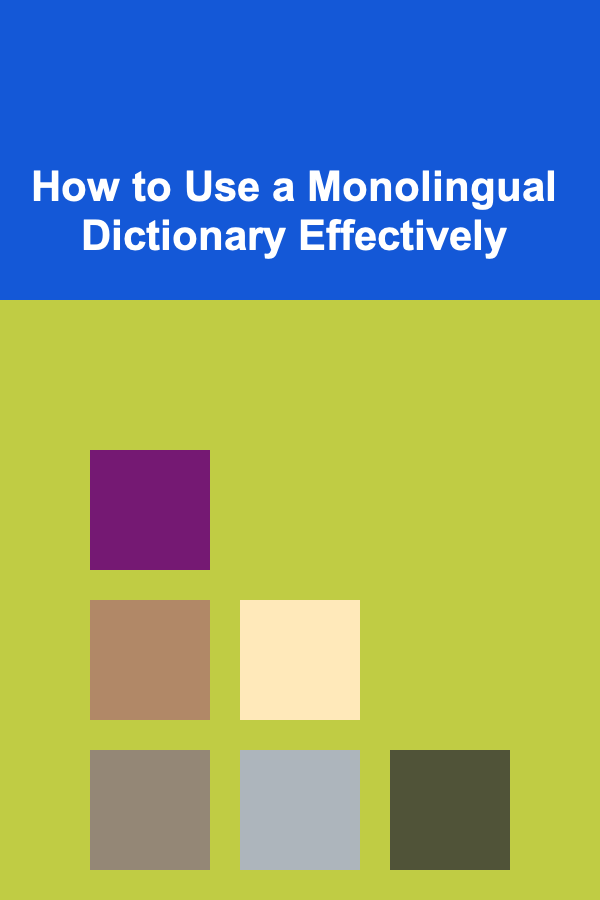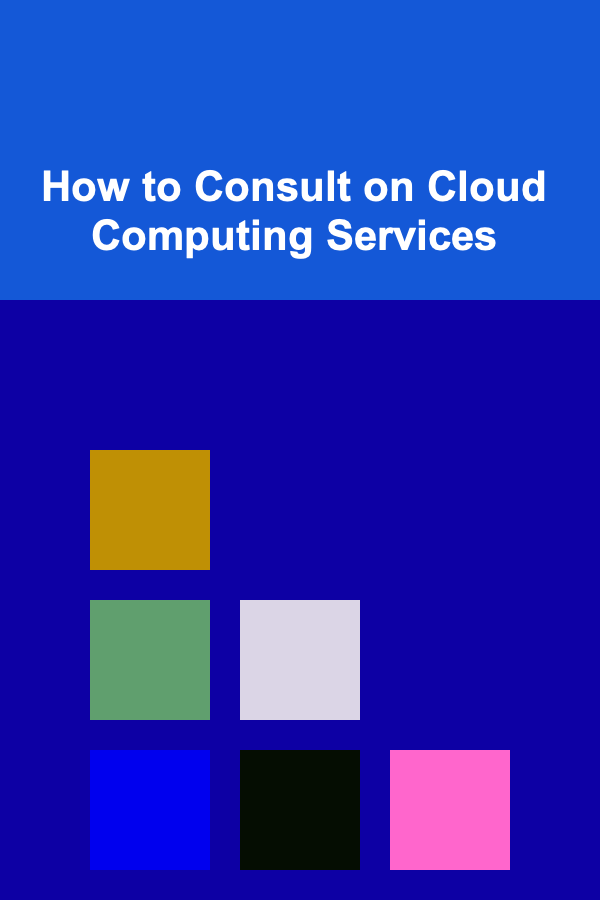
How to Use a Monolingual Dictionary Effectively
ebook include PDF & Audio bundle (Micro Guide)
$12.99$8.99
Limited Time Offer! Order within the next:

In the digital age, language learning and vocabulary expansion are pivotal to personal development and academic success. Whether you are a student, a professional, or someone learning a second language, one tool stands out as an essential resource: the dictionary. While bilingual dictionaries have their place, a monolingual dictionary is often more beneficial in providing a deeper understanding of a language. This article explores how to use a monolingual dictionary effectively to enhance your language skills, expand your vocabulary, and refine your understanding of words.
What is a Monolingual Dictionary?
A monolingual dictionary is a reference book or online tool that explains words in the same language they are defined in. Unlike bilingual dictionaries, which offer definitions in one language and their equivalent in another, monolingual dictionaries provide definitions, usage examples, and etymology (word origin) entirely in the language of the dictionary. For instance, an English monolingual dictionary will define words in English, helping learners gain a deeper insight into how words function in the language.
Popular examples of monolingual dictionaries include:
- Oxford English Dictionary (OED)
- Merriam-Webster Dictionary
- Collins English Dictionary
- Macmillan Dictionary
These resources are invaluable for learners who want to not just translate words, but understand them in their full linguistic and cultural context.
The Benefits of Using a Monolingual Dictionary
While bilingual dictionaries can be useful, they often limit your ability to truly understand the nuances of a language. Here are the key benefits of using a monolingual dictionary:
-
Improved Language Immersion: Using a monolingual dictionary forces you to engage with the target language at a deeper level. It helps you avoid the crutch of translating into your native language, allowing you to think and process directly in the language you're learning. This promotes immersion, which is a proven method for language acquisition.
-
Increased Vocabulary Understanding: Monolingual dictionaries often provide multiple definitions of words, showing the subtle differences in meaning depending on the context. This allows learners to understand the full range of a word's meanings and its proper usage.
-
Cultural Context: Many monolingual dictionaries, especially those for widely spoken languages like English, will include cultural notes and idiomatic expressions. This can help learners understand how words are used in real-world contexts, including slang, formal and informal registers, and regional variations.
-
Enhanced Learning Skills: Using a monolingual dictionary improves reading comprehension and contextual guessing. It encourages learners to deduce meanings from the definitions and examples, developing critical thinking skills that help with broader language learning.
-
More Accurate Word Usage: When you learn a word and its meaning in its native context, you're more likely to use it correctly in conversation or writing. This reduces the risk of miscommunication and helps learners avoid common mistakes made by relying on direct translation.
Step-by-Step Guide to Using a Monolingual Dictionary Effectively
1. Start with the Word You Need to Learn
When you encounter a word you don't know, either in reading or conversation, make a habit of immediately consulting your monolingual dictionary. This immediate response creates a proactive learning habit. The goal is not just to understand the word in isolation, but to learn it in the context of the sentence or situation.
Example :
Suppose you come across the word "elucidate" in a book. Rather than simply seeking the translation or definition, look it up in a monolingual dictionary. You will likely find the following information:
- Definition: To make something clear; to explain.
- Example sentence: "The teacher elucidated the complex theory with examples."
- Synonyms: explain, clarify, illuminate
- Word origin: From Latin elucidare, meaning "to bring to light."
By breaking down the definition, learning the synonyms, and seeing the word in a sentence, you can gain a comprehensive understanding.
2. Read the Entire Definition Carefully
One of the key elements of using a monolingual dictionary effectively is understanding the full scope of a word. This includes reading every part of the definition, not just the first line. Many words have multiple meanings, and each may apply to different contexts.
Take the time to read the definition carefully to absorb all meanings and nuances. Look for:
- Primary meaning: The most common or standard definition of the word.
- Secondary meanings: Other meanings that can apply in different contexts.
- Register: Whether the word is formal, informal, academic, technical, or slang.
- Usage notes: Information about how the word is typically used in sentences.
For example, the word "run" can have different meanings:
- To move quickly on foot.
- To operate or control something (e.g., "run a business").
- To flow or move (e.g., "The river runs through the city").
A monolingual dictionary would give these distinctions and help you understand exactly which meaning to apply.
3. Study the Example Sentences
Monolingual dictionaries often include example sentences to show how a word is used in context. These are incredibly valuable for understanding the practical application of a word. Take note of the grammatical structure and the word's placement in the sentence.
Example :
The word "chronic" might be defined as "persisting for a long time or constantly recurring." The example sentence could be, "He suffered from chronic headaches that lasted for months."
By observing how the word is used, you can better understand its practical meaning and how it might be used in your own writing or speech.
4. Learn the Synonyms and Antonyms
Most good monolingual dictionaries list synonyms (words with similar meanings) and antonyms (words with opposite meanings). This is an excellent opportunity to expand your vocabulary.
Learning synonyms helps you understand the subtleties of language. While two words may appear to have the same definition, the context or tone may differ. For example, the words "happy" and "ecstatic" are synonyms, but "ecstatic" conveys a much stronger emotion. Understanding this nuance can improve both your speaking and writing skills.
On the other hand, antonyms help you understand the limits of a word's meaning. Recognizing words that express the opposite of the target word allows you to refine your vocabulary further.
5. Look at Word Origins (Etymology)
Etymology is the study of the origin of words and how their meanings have evolved over time. Many monolingual dictionaries include this information, which can help deepen your understanding of a word.
Understanding a word's origin can give you insight into its meaning and how it is related to other words. For example, knowing that "benevolent" comes from the Latin root bene (meaning "good") and volens (meaning "wishing") can help you remember that the word means "wishing good" or "kind-hearted."
6. Practice Using the Word in Context
After you've looked up a word, it's important to use it actively. Incorporate the word into your writing and speaking to ensure that it becomes a part of your active vocabulary. The more you use the word, the better you will internalize its meaning and nuances.
7. Review and Reinforce What You've Learned
To retain the word and its meaning, regular review is essential. You can use flashcards or apps like Anki to test yourself on words and their meanings. Reviewing regularly will ensure that you don't forget the words you've learned and that they stay fresh in your memory.
8. Use a Digital Monolingual Dictionary for Convenience
While physical monolingual dictionaries are still valuable, digital dictionaries offer many advantages:
- Search function: Quickly search for a word without flipping through pages.
- Audio pronunciation: Listen to the pronunciation of words to ensure correct usage.
- Cross-referencing: Easily explore related words, synonyms, and examples.
Apps like Merriam-Webster , Oxford Learner's Dictionaries , and WordReference are all excellent tools for immediate word lookup, and they often come with additional features like thesaurus entries and pronunciation guides.
Conclusion
Using a monolingual dictionary is a powerful tool for mastering any language. It not only helps you understand words in depth but also strengthens your overall language skills by encouraging you to engage more deeply with the language. By incorporating a monolingual dictionary into your learning routine, reading and listening more attentively, and applying new words in context, you will increase your fluency and comprehension.
In the end, the goal of a dictionary isn't just to look up words---it's to become a more effective, confident, and precise communicator. By embracing the challenge of using a monolingual dictionary, you embark on a path toward greater language mastery and cultural understanding.

How to Consult on Cloud Computing Services
Read More
How to Set Clear Expectations for Your Virtual Assistant in a Dropshipping Business
Read More
How to Set Up a Seasonal Wardrobe Swap System
Read More
How to Make Healthy & Satisfying Lunches
Read More
How To Critique a Movie's Make-up and Hairstyling
Read More
10 Tips for RV Trip Planning as a Solo Traveler
Read MoreOther Products

How to Consult on Cloud Computing Services
Read More
How to Set Clear Expectations for Your Virtual Assistant in a Dropshipping Business
Read More
How to Set Up a Seasonal Wardrobe Swap System
Read More
How to Make Healthy & Satisfying Lunches
Read More
How To Critique a Movie's Make-up and Hairstyling
Read More